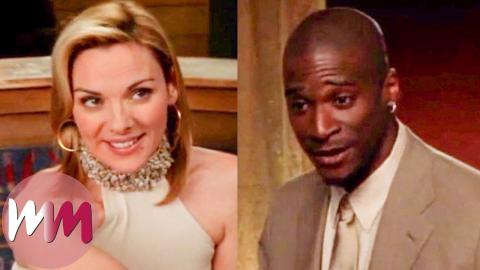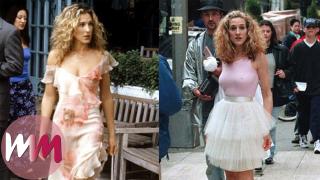Top 5 Sex and the City Storylines That Wouldn't Work Today

A lot has changed since Sex and the City first aired 20 years ago! For this list, we're looking at the scenes and plotlines that would raise eyebrows if they were aired today. We've included issues like subtle racism. Remember when Samantha starts dating Chivon? The entire storyline is full of awful cringeworthy moments from her fetishizing his blackness to the inclusion of the “angry black woman” trope with his sister, Adeena. A plotline like this would have been handled with much more insight and sensitivity if it were written today. How about slut shaming? In the questionably titled episode “Are We Sluts”, Charlotte laments that “nobody wants to marry a whore”. In the same episode, Carrie asks, "How Many Men Is Too Many Men?" when reviewing her sexual history. Despite all the positive things the show had to offer, these types of comments bring it back down to a much more regressive level.
#5: Subtle Racism
The New York of “Sex and the City” is shockingly whitewashed, with the characters very rarely coming into contact with people who aren’t Caucasian. The show does make attempts to tackle race issues though, but in this season three episode, their attempt totally falls flat. Samantha starts seeing a guy named Chivon who works in the music industry, and the entire storyline is full of awful cringeworthy moments, from her fetishizing his blackness to the inclusion of the “angry black woman” trope with his sister, Adeena. A plotline like this would have been handled with much more insight and sensitivity if it were written today.
#4: Carrie’s Financial Situation
Top 10 Best Carrie Looks from Sex and the City
In hindsight, TV viewers have come to realize that some of their favorite characters were living pretty unrealistic lifestyles in the big city. Journalism wasn’t quite as dead in 1998 when the show first aired, but it still seems implausible that Carrie could afford to live her lavish lifestyle on the salary of a newspaper columnist who seemingly produced approximately one piece per week. In one episode, she reveals that she has spent $40 thousand on shoes and you’ve got to wonder where that disposable income came from. We get it, her apartment is rent-controlled, but considering the amount of restaurant openings she attends and Cosmos she drinks, the numbers don’t add up.
#3: Playing on Stereotypes of Lesbians
Through her job at the gallery, Charlotte comes into contact with some women who she deems to be “Power Lesbians”, and, envying their lifestyle, decides to befriend them. As the story goes on however, modern re-watchers start to realize that this isn’t going in a very progressive direction. Basically... when Charlotte reveals that she isn’t actually a lesbian herself and just wants to be friends with them, the “Power Lesbians” quickly turn on her, using the all too common stereotype of the “angry” or “bitchy” lesbian. If this episode were written today, we can only assume that things would have ended differently.
#2: Slut Shaming
All things considered, “Sex and the City” did a lot for the concept of female sexual freedom, portraying the women as relatively sexually liberated and sex positive. Unfortunately though, in several instances, the writers did show their tendency toward slut shaming. In the questionably titled episode “Are We Sluts”, Charlotte laments that “nobody wants to marry a whore”. In the same episode, Miranda asks, "How Many Men Is Too Many Men?" when reviewing her sexual history. Despite all the positive things the show had to offer, these types of comments bring it back down to a much more regressive level.
#1: Carrie's View on the Sexual Spectrum
Top 10 Memorable Carrie Bradshaw Boyfriends
We get it, this episode aired in 2000 and in the years since, popular progressive views on sexulaity have come a long way. In current viewings however, watching "Boy, Girl, Boy, Girl", which deals with bisexuality, is pretty brutal. Carrie starts dating a guy who she soon finds out has also had relationships with men, and her totally tone-deaf opinion on the matter feels painfully outdated. Considering how progressive television has come when it comes to representations of characters who fall into the LGBTQ+ spectrum, this line of thinking surely wouldn’t be uttered by a supposedly open-minded main character nowadays.


 1
1
 0
0
 flagged
flagged


